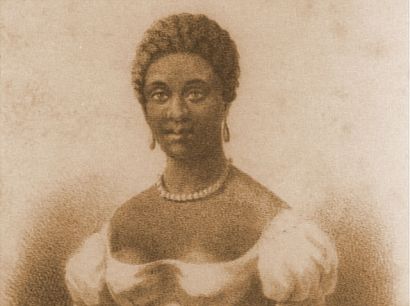This Week's Story
Opportunity comes to Phillis Wheatley from surprising sources.

This Week’s Story relives American history and the Bible through brief inspiring stories presented on mp3 audio recordings and text for reading.
Phillis Wheatley discovers Liberty! part two
The Wheatley family was devoutly Christian. They believed that slavery was morally wrong. Their faith affected the respect and opportunities for growth they gave to me, Phillis Wheatley, a slave.
Mistress Susanna saw that I had an aptitude for learning. She allowed Mary, her daughter, to teach me to read and write. I thrived! I learned to read and recite poetry. My ability to understand literature and the sacred writings pleased my mistress.
By age twelve I was reading Greek and Latin classics, and difficult passages from the Bible. I received a formal education. That range of study was extremely unusual for a slave in the 1700’s, or a female of any race.
I went to church gatherings with the Wheatley family and became a believer in the Lord Jesus Christ. My Christian faith and ability to read and understand the Scriptures led me to write poetry and eulogies. I was becoming known for my intellect and writings. Soon, I had written enough poems to pen a book.
My mistress would say, “Phillis, you have the best education Boston has to offer. No one can take your education from you.
“You are living proof that the enslaved African can make meaningful contributions to the arts. Books live on after we’ve gone on to glory.”
My first published article was in the Newport Mercury newspaper in 1767. I was only 14 years old. Often, I recited poems and eulogies I had written in the homes of friends of my mistress Susanna. These experiences built my confidence and developed clarity in my wording.
During the Great Awakening when George Whitefield, an immensely popular evangelist, died, I wrote a eulogy about him that was widely published! It was included in a book of my poems, which was financed by the Countess of Huntingdon, a member of the English aristocracy and a friend of my mistress Susanna.
Another poem I wrote was addressed to His Excellency, General Washington, when he was installed as Commander of the Continental Army. The Virginia Gazette, a pro-American newspaper, published it. I hoped to encourage George Washington to champion liberty and equality for the slaves in the Thirteen Colonies. Washington was a slave owner. He thanked me, publicly supported my writing, and invited me to his headquarters.
Much of American society was invested in slave trade and Boston publishers were not willing to invest in my writing, as a slave. They questioned that I had written my poems. Fortunately, the Countess of Huntingdon, was willing to fund volumes of my poetry. Finally, one bookstore owner-publisher agreed to publish my poetry, if prominent Bostonians attested that I, Phillis Wheatley, truly was their author. Several did!! Among them were Thomas Hutchinson, governor of Massachusetts; John Hancock, future signer of the Declaration of Independence; and John Wheatley, who had owned and freed me!
It has been written that I left the future with a courageous record of service. I believe God gave me intelligence and opportunity in a society where darkness did not extinguish freedom.
Gwen Crawford, with Adrian Novak, Nathan Thomas, and Barbara Steiner joined skills on this production. Check out thisweeksstory.com.
<< previous story] [next story >>
We invite your comments! [click here to comment]
This Week's Story is a non-profit supported by listeners. [click here to make a donation]
 click here to play audio
click here to play audio